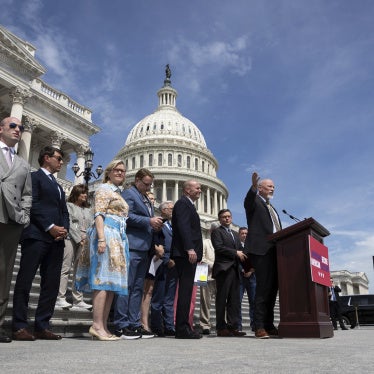With U.S. President George W. Bush due to visit Shanghai and Beijing in just 10 weeks, his administration badly needs a human-rights policy for China.
U.S. Secretary of State Colin Powell went to Beijing to lay the groundwork for Mr. Bush's visit and returned claiming his talks were "very productive." China's Ministry of Foreign Affairs chimed in, gushing about a "significant momentum" in Sino-U.S. relations. But diplomatic spin isn't the same as having a clear policy to promote human rights.
The White House knew it had to resolve the high-profile cases of Chinese-born scholars with American ties detained in China. It also had to tone down the rhetoric that portrayed China more as an emerging enemy than an emerging market.
Mr. Powell has done both. But now the White House needs a strategy to move beyond the damage control. It should creatively use Mr. Bush's participation at the October 20-21 Asia-Pacific Economic Cooperation summit in Shanghai, and state visit in Beijing, to achieve measurable momentum on human rights.
China's nervous leadership has a great deal at stake in pulling off a productive Bush visit. President Jiang Zemin and Premier Zhu Rongji need to stabilize relations with their biggest and most important trading partner so they can focus their attentions on the leadership succession and other pressing issues at home. With his trip coming at such a time, Mr. Bush has some leverage -- and he should use it.
The new U.S. ambassador to China, Clark Randt, should press for the release of scholars still detained, including U.S. citizen Wu Jianmin, who has just been formally arrested, Xu Zerong, an academic formerly based in Hong Kong, and Qu Wei, a Chinese citizen handed a 13-year prison sentence for allegedly giving "secrets" to Gao Zhan and Li Shaomin, the two scholars recently expelled from China. The Chinese government should be told that without these releases there is no way Mr. Bush's state visit can go smoothly; there will be no toothy smiles of the kind broadcast during Mr. Powell's trip to Beijing.
The administration also needs a policy to deal with the Xinjiang Uighur Autonomous Region in China's far northwest, a resource-rich area populated by the Muslim, Turkic-speaking Uighurs. Xinjiang is targeted for energy development and Premier Zhu is spearheading a drive to entice foreign companies and the World Bank to invest, hoping development will also dampen Uighur demands for autonomy or independence. Mr. Zhu went to Xinjiang last year and called for an "iron fist" to crush suspected separatists there.
Prior to President Bush's visit, the White House should negotiate an agreement giving United Nations human-rights monitors, the foreign media and diplomats unhindered access to both Xinjiang and Tibet, where repression accompanies development.
During his trip to China, Mr. Powell avoided mentioning individual cases and focused instead on "the whole issue of human rights and the rule of law." Now he should back that up by placing back on the table the issue of re-education through labor by which Chinese can be sentenced up to three years in prison without trial. The U.N. has urged an official review leading to the abolition of this practice of administrative detention. But there's been no progress beyond discussions in legal-academic circles. Pushing for the reform of such extra-judicial abuse is one way to push China to modernize its legal system as it prepares to join the World Trade Organization.
One issue where trade and human rights overlap is the emergence of the Internet in China, where more than 60 sets of draconian regulations have been imposed by the government to control its use. They censor foreign news and mandate strict supervision of chat rooms and electronic bulletin boards to prevent dissemination of information that allegedly "jeopardizes national security, reveals state secrets, subverts state power, or undermines national unity." A 40,000-strong force of Internet police has inspected Internet cafes, shutting down thousands, because of the downloading of various kinds of objectionable material.
President Bush should consider visiting an Internet cafe in Beijing or Shanghai. But first he should figure out what the U.S. and other APEC-member nations can do to pressure China to ease restrictions on the Internet. The goal should be to enhance the flow of commercial information and widen channels for free expression used by Chinese citizens. U.S. corporate sponsors of the 2008 Olympic Games in Beijing should also be asked to help.
Mr. Powell may have set the tone for better U.S.-China relations, and Mr. Bush's phone call to Mr. Jiang on July 5 may have helped break the logjam impeding release of the U.S. scholars. But it's too soon to tell whether these are first steps toward a serious China human-rights policy, or mere tactical political maneuvers.
Former President Bill Clinton was often accused of having a reactive, crisis-driven approach to China. The Bush administration has yet to show it can do any better.
Mike Jendrzejczyk is Washington D.C. Director of Human Rights Watch's Asia Division.






